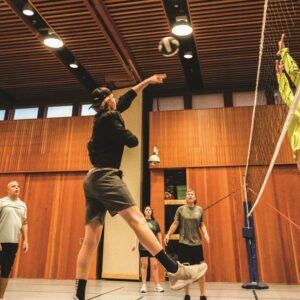TRURO — With the spring equinox just past, a familiar antsiness is on the rise. To fight it, Outer Cape residents have flocked full throttle to the biweekly volleyball games at the Truro Community Center. So many have turned out this year that, until outdoor play resumes in June when more space will be available, the teams are at capacity.
The game brings together players spanning 50 years in age and hailing from across the globe. As play begins, three teams are assembled with the vague intention of distributing skills. Then they rotate, round-robin-style, with each game played to 15 points rather than volleyball’s usual 25.
“This is community volleyball, not real volleyball,” says Alice Gong, one of the organizers, adding that “trying to win is usually not conducive to everyone having fun.”

Having fun is certainly this league’s priority. Still, a reporter detected a glint of competitive spirit in many players’ eyes.
“I like to win, but I’ll get over it very quickly if we don’t,” says Patrick Patrick, the proprietor of Provincetown’s Marine Specialties. He’s been a regular at these winter games for 30 years. “I’d play five nights a week if we had it,” he says.
Patrick has a predilection for playing at the net, where the priority is attack. The back row positions are defensive, the place where players typically receive the opposing team’s serves and spikes. In volleyball, unlike most other sports, players rotate when the serve switches sides, so everyone gets to play at each position.
Patrick’s power and accuracy at the net, particularly given his unassuming height, is impressive. But he’s not the only one who’s on his game. “The level of play has gotten higher over the years,” he says.
One part of that improvement appears to be thanks to Alex Reis, a Truro Dept. of Public Works employee who spent his youth playing volleyball on the beaches in his home city of Rio de Janeiro. When Reis first joined community volleyball in Truro four years ago, games weren’t played with a setter.
The setter, situated front and center at the net, typically takes the second touch — a maximum of three are allowed to get the ball over the net — and is supposed to deliver a controlled pass for an attacker’s strike. Reis says having a designated setter is important because “it grows the game.”
And while Reis habitually aces his serves with the effort of an exhale, his volleyball intentions run deeper. “I like teaching people,” he says. “I can read their skills and movements.” It’s clear he has a knack for discerning snags and offering fixes free from condescension. As a result, he’s become an unofficial on-court coach.
“You really have to make and hold space for people who are learning,” says Gong, who works as the program director for Twenty Summers, a nonprofit arts organization in Provincetown, and has lived in Truro since 2015. She was born in Beijing and grew up all around the U.S. — going from North Carolina to Boston to Santa Clara, Calif. Gong, an avid snowboarder and athlete-at-large, is also a force at the net and steadfast on defense. But it was community center volleyball that gave her an introduction to the sport.
Gong is not the only player to take her experience in other sports onto the volleyball court. Reis’s tip-giving role is apt, as he used to be a footvolley pro — footvolley is like no-hands volleyball, played with a football. The sport was invented at Copacabana Beach in Rio.
With one season of high school JV volleyball under my belt and half a Cape winter’s worth of pent-up energy on hand, I step onto the court to experience Reis’s teaching skills for myself. First, he insists I have more volleyball experience than I’ve admitted, which incites a boost to my mood. He tells me my balance and form are great. The issue, he says, is confidence. With more practice, he says, “your movements will be without fear.”
Reis knows what he sees. He tells me to lower the ball when I serve. Any shards of mortification at being the subject of a public tutorial are quickly overcome by the relief of (mostly) no longer missing my serves.
